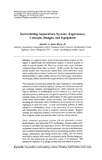Recirculating aquaculture systems: experiences, concepts, designs, and equipment
Share
Abstract
In a general sense, recirculating aquaculture system are designed tp approximate the fundamental aspects of natural system in order to support aquatic life. They may involve tank, pund, and other culture system where water is reused. In fish culture, the waste load mainly results from excreta and wasted feed, shich obviously cause water quality deterioration if unchecked. System management requires major attention to water quality, mainly dissolved oxygen, total ammonia nitrogen, nitrite, biochemical oxygen demand, and suspended solids.
The processes required and options for water treatment in recirculating systems have been clearly recognized. Among the critical processes are gas exchange (aeration and degasification), solids removal, and biological filtration or biofiltration. Solids removal is a solid-liquid separation process, and may onvolve garavity separation, filtration (screen, granual media, porous media), and flotation for finr organics and other solids (foam fractionation, protein skimming, froth flotation, and air stripping are other terms used). Biofiltration involves the use of living organisms to treat the wate. In tank recirculating system, it refers primarily to nitrification, which is the conversion of toxic ammonia and intermediate form nitrite to relatively harmless nitrate. In pund system and integrated system, biofiltration also includes the utilizationof aquatic plants and animals other than the culture species.
Other treatment processes include pH and alkalinity control, denitrification, and ultraviolet (UV) sterilization. Heaters and/ or chillersmay be proviede for trmperature control. While the processes and equipment are provided for specific purposes, thet are complementary, and a complex interrelationship exists in recirculating system. System design, components, and sizing criteria vary widely, and are mainly provided to comply with specific production needs, Recirculating systems for fish production are generally meant to be intensive. The paramount objectives is to design reliabel and cost-effective system.
Description
Excerpt from the Proceedings of the World Conference on Science and Technology, Manila, Philippines (13-15 September 2001).
Suggested Citation
delos Reyes Jr., A. A. (2002). Recirculating aquaculture systems: experiences, concepts, designs, and equipment. In L. G. Tansinsin, P. M. Halos, E. P. Sonido, P. G. Anglo, L. M. Rabago, F. B. Sevilla III, & F. T. dela Peña (Eds.), Harnessing Science and Technology to Meet the Global Challenge. Proceedings of the World Conference on Science and Technology, Manila, Philippines (13-15 September 2001) (pp. 65–81). Quezon City, Philippines: Philippine Association for the Advancement of Science (PhilAAS).

